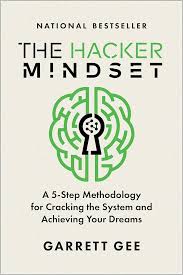This white paper explores the core principles of "The Hacker Mindset" by Garrett Gee, a framework that transcends the realm of computer hacking to empower individuals to approach life's challenges with creativity, resourcefulness, and a relentless pursuit of solutions.
The Hacker Mindset: A Framework for Innovation and Personal Growth
This white paper explores the core principles of "The Hacker Mindset" by Garrett Gee, a framework that transcends the realm of computer hacking to empower individuals to approach life's challenges with creativity, resourcefulness, and a relentless pursuit of solutions.
1. Introduction
"The Hacker Mindset" shifts the traditional perception of "hackers" from cybercriminals to individuals who possess a unique set of skills and mindsets. Gee argues that the essence of hacking lies in:
- Identifying and exploiting vulnerabilities: Recognizing limitations and inefficiencies in systems, processes, or even personal circumstances.
- Thinking outside the box: Challenging conventional wisdom and exploring unconventional solutions to problems.
- Continuous learning and experimentation: Embracing a growth mindset and constantly seeking new knowledge and skills.
- Resourcefulness and improvisation: Making the most of available resources and finding creative ways to achieve desired outcomes.
2. Core Principles of the Hacker Mindset
- Challenge Assumptions: Questioning the status quo and conventional wisdom.
- Embrace Constraints as Opportunities: Viewing limitations as challenges to overcome and as catalysts for innovation.
- Develop a Growth Mindset: Cultivating a love for learning, embracing failure as a learning opportunity, and constantly striving for improvement.
- Build a Strong Foundation: Developing essential skills such as critical thinking, problem-solving, and communication.
- Leverage Technology: Utilizing technology effectively to enhance productivity, creativity, and communication.
- Build a Network: Connecting with like-minded individuals, mentors, and collaborators to expand knowledge and support.
- Take Action: Translating ideas into action and embracing experimentation and iteration.
- Ethical Hacking: Utilizing hacking techniques for ethical purposes, such as improving security and identifying vulnerabilities.
3. Applying the Hacker Mindset in Everyday Life
- Career Development:
- Identifying career paths: Hacking traditional career paths by exploring unconventional career options and identifying unique opportunities.
- Skill Development: Continuously learning new skills and adapting to the ever-changing job market.
- Entrepreneurship: Applying the hacker mindset to identify and exploit market opportunities.
- Personal Growth:
- Overcoming challenges: Approaching personal challenges with a problem-solving mindset and identifying creative solutions.
- Developing new habits: Hacking your habits by identifying and breaking down bad habits and establishing new, positive routines.
- Improving productivity: Utilizing technology and organizational techniques to optimize productivity and achieve more with less effort.
- Social Impact:
- Solving social problems: Applying the hacker mindset to address social issues and create positive change in the world.
- Community building: Utilizing technology and collaborative approaches to build strong and supportive communities.
4. Ethical Considerations
While the hacker mindset emphasizes creativity and resourcefulness, it's crucial to ensure ethical considerations are always paramount. This includes:
- Respecting the law and intellectual property rights.
- Prioritizing privacy and security.
- Using technology responsibly and ethically.
- **Considering the potential impact of your actions on others.
5. References
- "The Hacker Mindset" by Garrett Gee
- "Mindset: The New Psychology of Success" by Carol S. Dweck
- "Deep Work: Rules for Focused Success in a Distracted World" by Cal Newport
- "The1 7 Habits of Highly Effective People" by Stephen R. Covey2
Disclaimer: This white paper provides a general overview of the Hacker Mindset. The specific applications and interpretations of these principles will vary depending on individual needs and circumstances.
